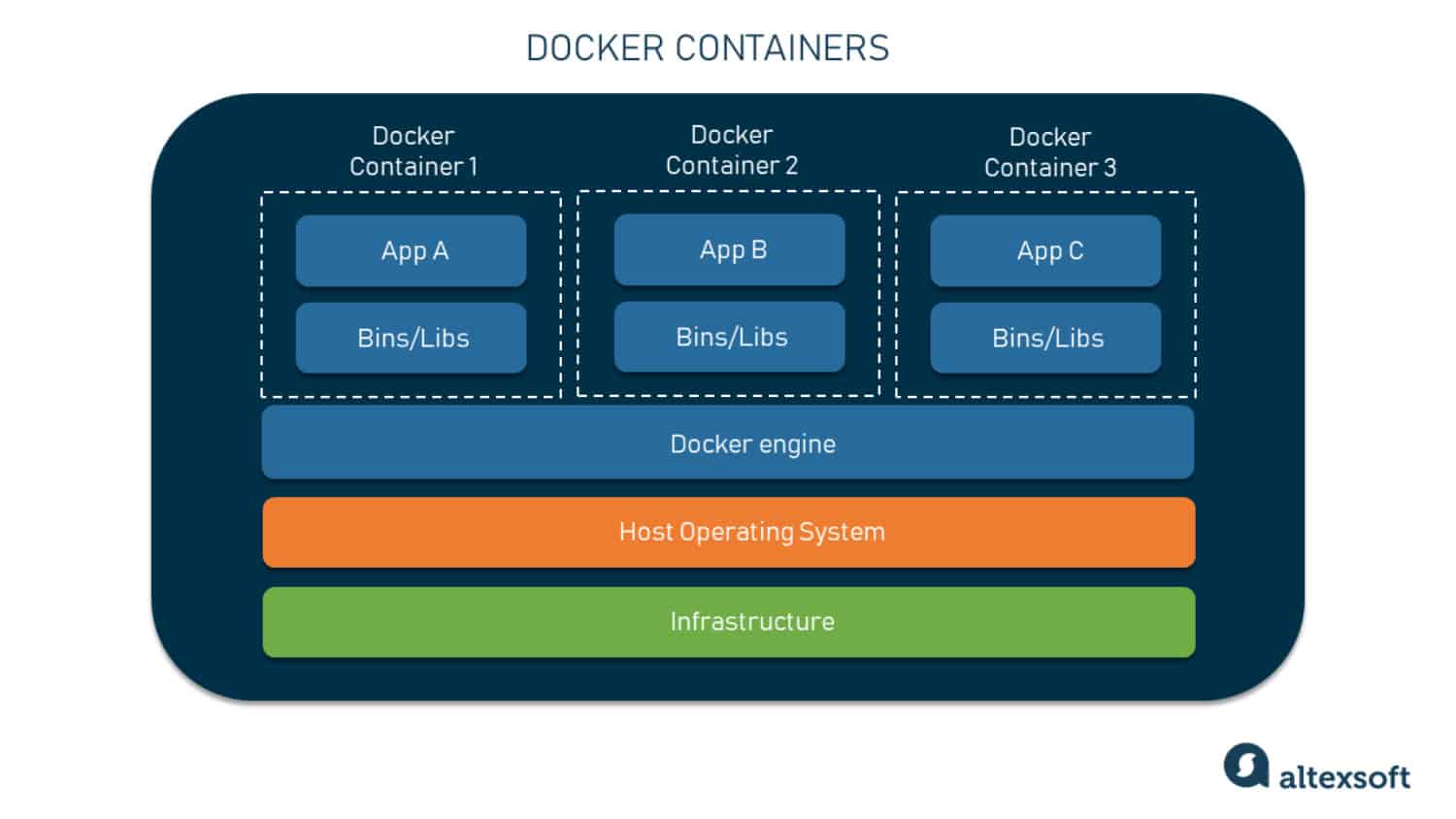Unquestionably, Docker has transformed the field of DevOps by providing a reliable containerization solution that improves the effectiveness, speed, and consistency of software development and deployment. Thanks to its capacity to package programs into isolated, self-sufficient containers, it has been a crucial participant in the move towards microservices architectures. So, what is Docker in DevOps? The article discusses it in detail.
A DevOps technology called Docker is primarily helpful in building, distributing, and running applications inside containers. To fully use Docker’s advantages, customers must manage a variety of difficulties, from security worries to permanent data storage.
Docker’s impact on the development and operations of software is evident. Docker will significantly enable creative software delivery as more businesses adopt DevOps approaches. It is becoming increasingly crucial to comprehend Docker and hire DevOps engineers to fit in the DevOps ecosystem. What is Docker in DevOps? Read below to learn more.
See Also: What Is The Software Development Lifecycle? – Complete Guide
Table of Contents
What Is DevOps?
It comprises the words “Development” and “Operations.” Software operations and development are combined in this software engineering technique within a company.
A business can deliver applications and services quickly with DevOps-related tools, procedures, and cultural concepts. It’s a particular ecosystem required to automate processes between the development, testing, and IT teams. Because of this, the software is efficiently built, tested, and launched.
The products improve faster thanks to this ongoing cycle of cooperation and iterative improvement throughout the software development life cycle. The client services are also improved, and the performance is superior to the competition, thanks to the project management quickness of DevOps. Check out this list of channels to learn web development.
See also: Top 10 Best WYSIWYG HTML Editing Software For 2024
What Is Docker?
What is Docker in DevOps? Docker is a platform for containerization that is open-source and free. Programs can be packaged by developers using containers. Hence, one can combine the OS libraries and dependencies with application source code in standardized executable components. That code can be executed by it in any setting. Containers, which are becoming increasingly common as companies adopt cloud-native development and hybrid multi-cloud settings, make it easier to distribute dispersed programs.
Programs that can “write once, run anywhere” are made possible via containerization. For the development process and vendor compatibility, portability is crucial. Containers are frequently referred to as “lightweight,” which suggests that they share the machine’s operating system kernel and don’t need to be associated with each application’s operating system.
Since containers are smaller and start up more quickly than virtual machines, several can run on the same amount of processing power as one virtual machine. As a result, server efficiency improves, and costs for servers and licensing drop.
What Is Docker In DevOps?
What is Docker in DevOps? The DevOps ecosystem is designed for this platform. It is an appropriate remedy for software companies that require assistance to stay up with the rate of change in company, technology, and customer demands. As a result, Docker is an obvious option for accelerating and scalably expanding business processes.
Docker’s success in DevOps is due to its capacity for containerizing apps. Additionally, it shortens software development companies’ time to create and release solutions.
What is Docker in DevOps?It aids in overcoming the difficulties presented by the “Dev” and “Ops” environments. Regardless of the host configurations, it enables an application to execute on any application.
Benefits Of Using Docker
Here are some benefits of using Docker.
- Agility: One can package the application and its libraries, binaries, and configuration files using container technology like Docker. Hence, it facilitates the speedy creation of a single package easily deployed in many contexts and platforms.
- Less Overhead: Containers share the resources and the guest operating system. Because of this, using the container is far quicker, lighter, and more effective than using virtual machines.
- Version Control: Containers make it simple to manage several applications’ versions. Moving between environments without thinking about particular adaptations is also beneficial.
Why Should One Use Docker In DevOps?
Here are a few reasons for using Docker in DevOps.
Environment Standardization
By reducing the differences between various environments, Docker helped to standardize the environment. What is Docker in DevOps? With this technology, businesses can ensure that each team member works in the same domain and that the development environment is repeatable. Leading enterprises use Docker for production, testing, and development. 
Most importantly, Docker also creates configuration files so each team member can access and set up their environment.
Faster And More Consistent Configuration
Docker uses simple configuration files. You must deploy the code after adding your configuration. Because Docker supports many different environments, you may reuse the same setup repeatedly. 
What is Docker in DevOps? The quickest project setup for novice developers is the main benefit of adopting Docker. Hence, the working environment for each developer can remain constant.
Once consistency has set in, you can bypass the laborious environment setup and permit new developers to begin any programming immediately. Above all, Docker reduces the time needed for process setup and deployment documentation.
Better Recovery From Disaster
Disaster never knocks on your door uninvited. However, Docker offers backup in an emergency. If a significant problem arises, the lost data may be recovered later.  For instance, a corporation is likelier to lose data if hardware breaks down. What is Docker in DevOps?However, Docker makes it simple to replicate the file on fresh hardware.
For instance, a corporation is likelier to lose data if hardware breaks down. What is Docker in DevOps?However, Docker makes it simple to replicate the file on fresh hardware.
See Also: What Is The Software Development Lifecycle? – Complete Guide
Docker Tools And Terms
When utilizing Docker, developers may come across the following tools, terms, and technologies:
- Docker Images: The tools, libraries, and dependencies can run an executable application as a container in Docker images. Hence, one can generate many container instances at the time of execution of the Docker image. Although creating a Docker image from scratch is an option, most developers download them from public repositories. However, a single base image can produce several Docker images sharing the same stack.
- Docker Daemon: The Docker daemon is a service that uses commands from the client to create and maintain Docker images. In essence, your Docker implementation’s control panel is the Docker daemon.
- Docker Hub: The “world’s largest library and community for container images” is at the public Docker image repository. Hence, it contains more than 100,000 container images from independent developers, open-source initiatives, and commercial software providers. That’s all for what Docker is in DevOps.
FAQs
What is the benefit of Docker?
Docker accelerates code deployment and infrastructure management by offering tidy, repeatable, modular environments. Whether used for development, testing, deployment, or production, Docker has several advantages.
What are Docker images?
A Docker image file runs a program within a container. They serve as a collection of container creation steps. Images are the starting point in this case.
What is a pipeline in DevOps?
A set of automated procedures and tools make up the DevOps pipeline. It enables developers and operations specialists to collaborate when creating and deploying code in a production environment.
What is the minimum memory limit for Docker?
The smallest permitted value is 6m. A container short on kernel memory may block host system resources since kernel memory cannot be swapped out, which could impact both the host machine and other containers.
Conclusion
It was all about what Docker is in DevOps. A great technology that helps with continuous deployment is Docker. It seamlessly integrates with the current configuration management tools. Many applications are present in its expansive and growing ecosystem. You may create containerized apps and apps with multiple containers using Docker, which has many advantages.




